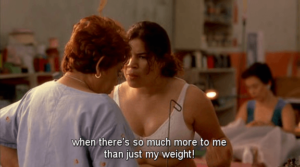
Real Women Have Curves is a film that focuses on the obstacles that a young woman faces within her traditional Latina/o household. Ana, the main character, is constantly trying to distance herself from the patriarchal ideologies her family was so used to living but her mother constantly shamed her for being ‘different.’ Carmen, her mother, thought that the ‘perfect’ woman was supposed to work and support her family. Ana rejected this lifestyle immediately and decided she wanted to build herself by pursuing an education and loving herself, but Carmen considered this a selfish thing to do. She always wondered why Ana chose to “rebel” against her and thought there was something wrong with her daughter.
From the very beginning of the movie, Ana’s independent persona made her family and other community members very uncomfortable. Carmen, Ana’s mother, was more mortified than anything. She could not stand how Ana was outspoken, blunt, raw, and so intelligent. Ana was not a pushover either so whenever her mother tried to talk down on her, she always stood up for herself. In her strange mind, Carmen believed that submissive women were a healthy tradition within the family. Deep down, I feel as though Carmen was jealous of Ana because she never had the courage to break away from a cycle that never made her happy. In the poem “Machismo Is Part Of Our Culture,” author Marcela Christine Lucero-Trujillo talks about how the presence of machismo is always reminded by Latinas/os everywhere you go. This made me think about the film because Carmen seemed to constantly bring up the “fact” that men had to be in control of everything in order for anything to be functional. She also made it seem as though women had to be the nurturers of the home so everyone’s well being fell on their hands, not the man’s. If anyone tried breaking this so-called tradition, she would shame them and make it seem as though they were the ones with bad hearts.
Ana’s mother is the perfect example of a misogynistic woman. Carmen always made Ana feel terrible about her weight because she would tell her that no man would ever love a woman with so many curves. I thought she was full of contradictions too because she slapped Ana once she had an idea that she was not a virgin anymore. I was so confused because I thought she wanted her daughter to find a man that would take care of her but I guess she wanted to keep the cycle of machismo going and she knew that the guy Ana was seeing was anything but “traditional.”
At the end of the film, I was so happy Ana got to live her dream of going to college far away from her family. I did not feel sorry for Carmen at all. I was so angry when she let her pride take over and did not bother saying bye to her daughter. I thought she was selfish throughout the entire film and she had no right to mentally and verbally abuse Ana the way she did. Sometimes we have to risk hurting others in order for us to live the life we deserve.
In “Imagined Borders: Locating Chicano Cinema in America/ América,” author Chon A. Noriega discusses the impact of cinema entertainment within the Chicano community. Cinema is used as a way to express struggle through a personal lens and it helps the audience relate to certain scenarios on a deeper level. This form of entertainment can be tricky because there are some Latina/o films that still promote the ideology of patriarchy, making it seem as traditional and normal. The reason why Real Women Have Curves is so special and moving is because it teaches people a lot about the negativity regarding patriarchy and masculinity, specifically in the Latina/o community. It also shows how women can internalize it and project it onto others. This is one of the few films in which women took over the lead roles and the men were just the supportive actors, which made it even more empowering and different.
I highly recommend this film to people of different cultures, backgrounds, ethnicities, and genders. The family portrayed in the film can apply to different communities because patriarchy affects almost every culture. Women can also find this film very beneficial and empowering because it helps us embrace the importance of building our identities and accepting our existence without the validation of anyone.
